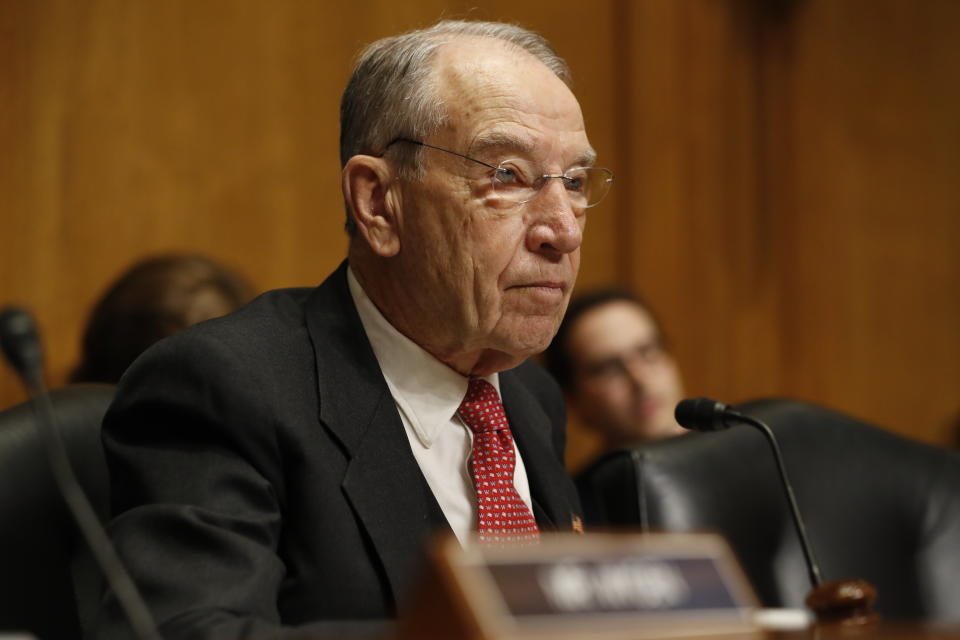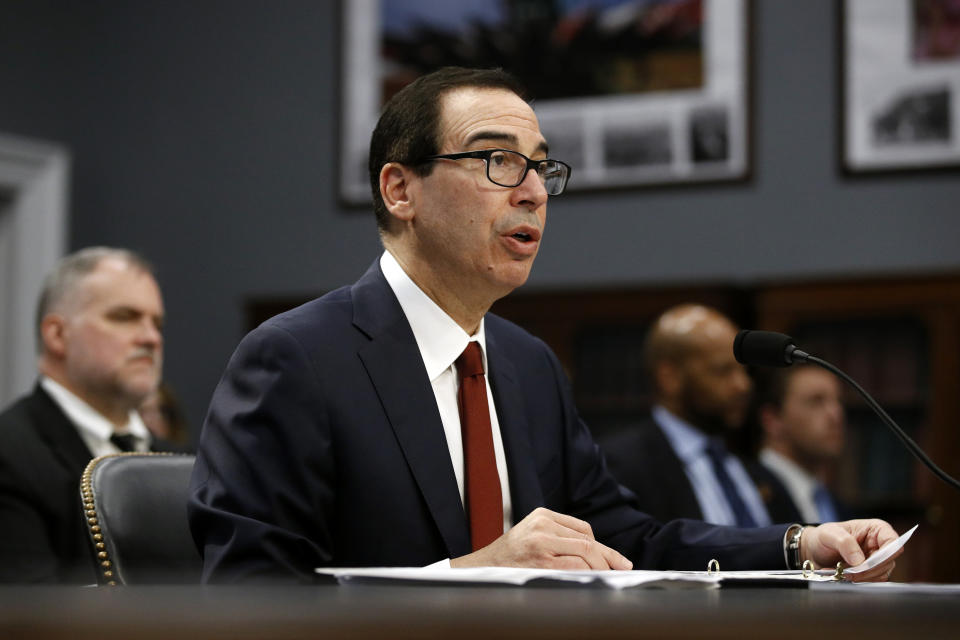Yes, Congress Has Pried Open Tax Returns For Political Purposes Before
Republicans say Democrats gunning for President Donald Trump’s tax returns using a federal disclosure law could set a terrible new standard.
If Democrats get their way, “nothing could stop a committee chairman from obtaining the tax returns of any politically disfavored individual,” Treasury Secretary Steve Mnuchin wrote in a letter to House Ways and Means Committee chair Richard Neal (D-Mass.) last week.
It’s true that the Democratic request for a sitting president’s taxes is highly unusual. Presidents normally disclose their tax information voluntarily, so there hasn’t been a need.
But it certainly is not the first time lawmakers have used the tax disclosure law against their political enemies.
In 2014, House Republicans obtained and disclosed private tax information as part of a campaign against an Internal Revenue Service official they claimed had unfairly singled out conservative groups for audits.
And in 2006, Republicans on the Senate Finance Committee asked the IRS for all kinds of tax information about the Association of Community Organizations for Reform Now, or ACORN, a group that registered voters and advocated for poor people.
At that time, Republicans loved to vilify ACORN. They claimed it helped Democrats try to steal elections. The George W. Bush administration ordered U.S. attorneys around the country to prosecute voter fraud wherever they could find it, resulting in more than 300 investigations and many newspaper headlines about ACORN.
That’s why Republicans went rooting around in ACORN’s tax filings. Senate Finance Chair Chuck Grassley (R-Iowa) asked the IRS for all returns from ACORN and its affiliates from the previous five years, plus any documents related to past or ongoing audits.
“Engaging in vote fraud is not an appropriate activity for an organization that receives special treatments and exemptions under the tax code,” Grassley wrote in a November 2006 letter to then-IRS Commissioner Mark Everson.
Tax-writing committees in Congress routinely obtain private tax information as part of their oversight mission, and often on a nonpartisan basis. The Senate Finance Committee’s investigation into the IRS allegedly targeting conservative groups, for instance, was bipartisan. And the ACORN case is just one instance of Grassley doing nonprofit oversight; in February he asked the IRS to share tax information about nonprofit hospitals to make sure they’re fulfilling their charity obligations to surrounding neighborhoods.
But Republicans had a brazenly partisan reason to attack ACORN: The group registered poor people to vote in cities, so it registered a lot of Democrats. The fraud claims, such as a case in Kansas City, Missouri, that Grassley cited in his IRS letter, typically focused on improper registrations that resulted from mistakes that ACORN itself had flagged for state officials.

Grassley insisted that fetching ACORN’s tax info was nothing like the Democratic effort to see Trump’s returns.
“It’s a lot different because we were using it for legislative purposes,” Grassley told HuffPost. The Trump tax return request, on the other hand, “is being used for political purposes. It’s black and white. And oversight is legitimate for legislative purposes to see that the laws are faithfully executed.”
Former ACORN chief executive Bertha Lewis said Grassley has a point about it being black and white. “We were black and they were white,” Lewis said.
Neal based his request for six years of the president’s personal and business tax returns on a need to evaluate the IRS practice of automatically auditing the president every year. Other Democrats on the committee have said they want to know if the IRS is properly enforcing the tax code in Trump’s case, since the president’s family has reportedly used fraud to lower its tax bill.
The tax disclosure law has been on the books since 1924, when it was enacted amid a major corruption scandal specifically to give Congress the same power of tax disclosure that the president already enjoyed. The law has never been used to grab such a high-profile politician’s tax information, but Trump is the first modern president not to voluntarily disclose his own.
If Democrats can overcome the Trump administration’s stonewalling and get Trump’s returns, the documents may turn out to be a huge nothing burger. That’s what happened with ACORN.
Despite intense scrutiny over a period of several years, Republican prosecutors never managed to find a single instance of an actual fraudulent vote cast as part of an ACORN fraud conspiracy. Instead, the improper firings of U.S. attorneys who refused to prosecute ACORN employees and other Democratic targets became a scandal of its own, contributing to the eventual resignation of Attorney General Alberto Gonzales in 2007.
We were black and they were white. Former ACORN chief executive Bertha Lewis
Grassley did not release any information about his ACORN tax findings until September 2009, when a different ACORN controversy put the organization back in the news. Right-wing propagandist James O’Keefe secretly recorded ACORN employees talking to himself and a colleague pretending to be a pimp and a prostitute. O’Keefe wrongly claimed the videos showed ACORN giving illegal tax advice and committing other crimes. Professional journalists took O’Keefe’s word that the African American ACORN employees in his videos were indeed breaking the law. A frenzy ensued.
That month, Grassley belatedly released the findings of his staff’s investigation into ACORN’s tax treatment. The report found that ACORN and its nonprofit subsidiaries improperly commingled funds, with dollars raised for charitable activity being used for “impermissible lobbying and political activity.” But it wasn’t clear that the actions actually broke the law, and the agency “would likely have a high hurdle to clear in order to revoke the tax-exempt status of any of the ACORN tax-exempt entities.”
But the supposedly scandalous videos were enough for Congress to pass a law that September, with overwhelming support from Democrats, prohibiting ACORN from receiving any federal grants. The organization subsequently lost its private funding and folded the next year.
Lewis said Republicans “used sometimes very obscure tax law and nonprofit law to attack us.”
ACORN received only 10% of its funding from the government, Lewis said, but the impression created from all the investigations crippled the organization’s ability to raise money. Lewis is now the president of the Black Institute, a New York-based “action tank” that advocates public policy that benefits African Americans.
“I guess he’s right, it is different,” Lewis said, referring to Grassley. “We were a nonprofit community organization. [Donald Trump] is the president of the United States. Maybe 10% of our funding came from federal grants at the time. So yeah, he’s right, it’s completely different.”

Senate Finance Committee spokesman Michael Zona stressed in a statement that Trump is an individual, while ACORN was a nonprofit with special tax privileges.
“Federal law restricts tax-exempt organizations from engaging in certain political activity,” Zona said. “That was the central issue with ACORN, which was credibly accused, with substantial public evidence, of engaging in partisan political activity. That’s well within the scope of legitimate congressional oversight.”
Zona also stressed that Grassley’s investigations typically do not result in any of the information being made public. “It’s clear that’s what House Democrats’ ultimate goal is with President Trump’s tax returns,” he said. (Democrats claim that’s not their plan.)
And Zona said the ACORN work was bipartisan. Even though Democrats did not sign the letter to the IRS or the staff analysis of ACORN’s taxes, Grassley repeatedly consulted with Sen. Max Baucus (D-Mont.) during the process, he noted.
Ashley Schapitl, a spokeswoman for Democrats on the Senate Finance Committee, denied that the ACORN investigation was bipartisan.
“Senator Baucus did not join Chairman Grassley’s request to IRS for ACORN’s tax information,” Schapitl said. “He was merely copied on the request when it was made. Democrats did not, and do not, consider the ACORN probe to be bipartisan.”
This article has been updated to include Ashley Schapitl’s statement.
This article originally appeared on HuffPost.

